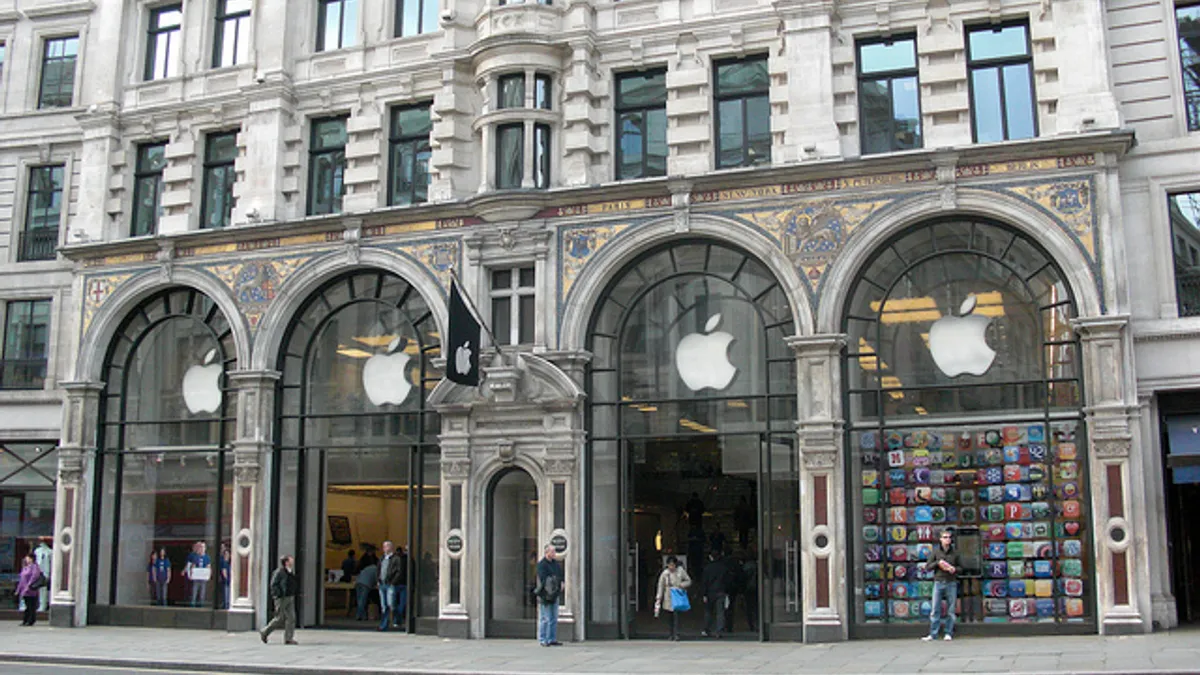Brief:
- Apple temporarily waived the 30% commission it collects on paid events and livestreamed experiences on mobile apps like Facebook and Airbnb. The suspension of the fee is in response to app developers requesting to sell online experiences while the pandemic prevents in-person gatherings, an Apple spokesperson told The Wall Street Journal.
- Apple announced the change after Facebook issued a statement saying that businesses would be able to keep all earnings, minus applicable taxes, from paid online events that they host on the social network. Facebook had asked Apple to waive its fee to help small businesses that were struggling during the pandemic, a request that Apple denied.
- A Facebook spokesperson said Apple's temporary suspension was too short and should include all businesses that host live events on the social network, not just ones that previously sold physical goods or services before the onset of the panic, the Journal reported. Facebook won't collect any fees from paid online events until at least next August, the company announced.
Insight:
Apple's temporary suspension on paid virtual events offered through apps like Facebook is positive for small businesses and sole proprietors that can't meet customers in person during the pandemic. Instead, they can earn money by creating livestreamed content that includes virtual workouts, art classes or cooking instruction videos. All businesses are eligible for the exemption except creators of gaming live streams, who likely haven't experienced major disruptions from the pandemic — and may even have expanded their viewership as people spend more time at home.
Apple's decision to waive the fees comes after Facebook had asked for an exemption as the social network prepared to offer a way for businesses, creators, educators and publishers to make money by hosting online events. Facebook sought to help those businesses and professionals by giving them a platform to connect with customers, scout for new clients and accept payments.
When the social network rolled out the service last month, it said it wouldn't collect fees on in-app payments for live events. Google also agreed to waive its 30% commission on in-app purchases in the Android version of Facebook, CNBC reported. Apple not only denied Facebook's request for a waiver, but it also blocked an update to Facebook's app that warned people who paid for online events that Apple would get a cut, forcing the social network to remove the message, Reuters reported.
In addition to small businesses, Airbnb also may benefit from Apple's temporary suspension of fees on events as the vacation rental company builds out its "online experiences" platform. With many people unwilling to travel during the pandemic, Airbnb has added a variety of paid virtual experiences that include cooking and dance classes, concerts, workouts, guided video tours of foreign cities, poetry readings and fortune telling, among others. In May, Airbnb collaborated with women-first dating app Bumble to provide virtual first dates to people stuck at home during the health crisis.
For Apple, the suspension of its fees is significant because it typically doesn't let app developers process payments on in-app purchases (IAPs) or to use third-party services due to concerns about online security. By making app developers use its payment system, it can collect a 30% commission on app sales, IAPs and the first year of digital subscriptions. The fees don't apply to companies that sell physical goods and services through their apps, such as retailers, restaurants, ride-hailing companies and rental home marketplaces.
Apple's App Store in 2019 generated $138 billion in commerce in the U.S., and more than $116 billion went to app developers, Apple announced in June.
As the gatekeeper of App Store, Apple has faced growing criticism from app developers for charging excessive fees and having an unfair competitive advantage in the app marketplace. Audio streaming platform Spotify, "Fortnite" creator Epic Games and Tinder owner Match Group this month formed an advocacy group called the Coalition for App Fairness to push Apple and other app stores to change their rules on how apps can operate. Apple's control of the App Store is said to be a focal point for U.S. antitrust investigators and the company also faces a European Union antitrust investigation into the App Store and Apple Pay.














